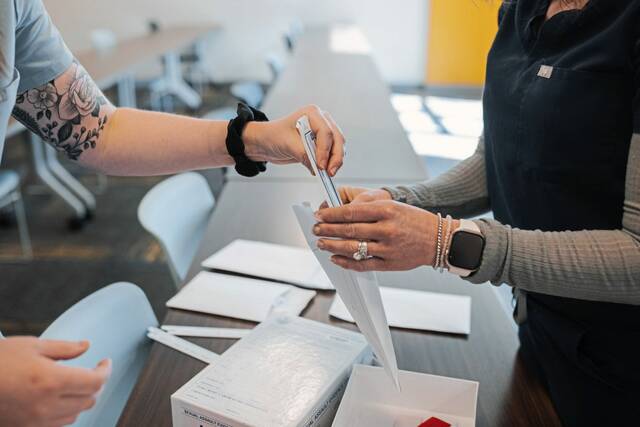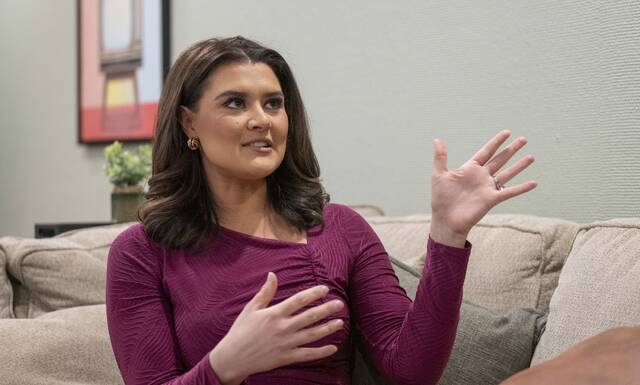The case against the man convicted of killing 11 people at a Squirrel Hill synagogue will resume Monday with jurors continuing to listen to testimony from mental health experts in the trial’s eligibility phase.
Robert Bowers, 50, of Baldwin was found guilty of killing members of the Tree of Life-Or L’Simcha, Dor Hadash and New Light congregations who were worshiping at the synagogue Oct. 27, 2018.
Killed were Rose Mallinger, 97; Bernice Simon, 84, and her husband, Sylvan Simon, 86; brothers David Rosenthal, 54, and Cecil Rosenthal, 59; Dan Stein, 71; Irving Younger, 69; Dr. Jerry Rabinowitz, 66; Joyce Fienberg, 75; Melvin Wax, 87; and Richard Gottfried, 65.
The federal government must persuade the jury, which convicted the defendant on all counts, that Bowers is eligible to receive a death sentence. To do so, jurors must agree unanimously that the government has proved at least one of four aggravating factors they’ve alleged and that Bowers had the requisite intent to kill.
The defense, which put forward no evidence in the trial’s guilt phase, called five experts in the eligibility phase to bolster its argument that Bowers has schizophrenia, epilepsy and other brain abnormalities, making it impossible for him to form the intent needed to be considered for death.
Last week, which was shortened by the July 4 holiday and a scheduled day off Friday, featured three witnesses.
Day 19
16. Dr. Erin David Bigler (5 hours, 15 minutes)
Bigler, an expert in neuropsychology who retired from Brigham Young University in 2018, testified that he reviewed the test data, brain imaging and reports from defense and government experts.
He found that, while the defendant scores in the top 10th percentile, he has deficits in some areas of cognitive function, including his brain’s processing speed, ability to recognize faces and social cues.
All of those, Bigler said, can be consistent with schizophrenia.
Bigler told the jury that white-matter hyperintensities, or lesions, in Bowers’ brain can have a correlation with schizophrenia.
He also said the defendant had trouble in one task involving sorting a deck of cards, which could indicate a problem in his frontal lobe, which might be an impairment in executive function.
Day 20
17. Dr. Ryan Darby (5 hours, 45 minutes)
Darby, called by the prosecution as their first witness in rebuttal, directs the frontotemporal dementia clinic at Vanderbilt University Medical Center. A behavioral neurologist, he said Bowers shows no signs of schizophrenia or epilepsy and no signs of impairment in executive function.
There also was no evidence of impulsivity or emotional disregulation, he said.
Instead, Darby said, Bowers was able to plan the attack and carry it out.
Bowers told Darby he was calm and focused at the time of the attack, and that, if he could do it over, he would do more research to ensure more people were killed.
Darby agreed with defense experts that there were white-matter lesions in Bowers’ brain, but he said they most likely are the result of vascular disease.
During his testimony, Darby said he reviewed records from Children and Youth Services that showed they were involved in Bowers’ life when he was 6 months old.
Those records showed there was evidence of suicidal threats and violent gestures by both parents. Darby said Bowers’ mother kicked down the door to their apartment and threatened to throw her infant son out of a window, while his father, who killed himself a few years later, threatened to turn on the gas in the stove to kill himself and the baby.
At 10, Darby continued, Bowers talked about throwing himself off a bluff and attempted suicide at 17 by overdosing on over-the-counter medication.
In their interview, Bowers told Darby that, as an adult, his interests turned to politics and religion. He began to investigate conspiracies about Jewish people online, including watching YouTube videos and eventually going to the social media website Gab.com. He believed Jews were orchestrating an effort to undermine white culture and white nations.
“He became increasingly concerned these ideas were accurate,” Darby said. “He saw himself as a soldier in that war, as he described it.”
Darby, who earned $350 per hour for his testimony, said Bowers’ belief in the end times and Great Replacement theory are unrelated and that neither of those represent delusional thinking by Bowers.
“My opinion, they are not delusional, nor the result of neurological disease,” Darby said.
Day 21
17. Dr. Ryan Darby (continued, 2 hours, 18 minutes)
Darby returned to the witness stand on cross-examination by defense attorney Michael Burt.
As part of his evaluation of Bowers, Darby said, he reviewed records from 1985 that diagnosed the defendant as having chronic depression, adolescent adjustment reaction and a homicide attempt (for holding a lighted aerosol can and threatening an older boy. The records said a “possibility of incipient schizophrenia could not be ruled out definitively.”
At the time, Bowers was prescribed Thorazine, an antipsychotic medication.
Darby also told the jury he reviewed records showing that, while Bowers’ mother was 8 months pregnant with him, she was beaten and thrown down the steps by his father.
On cross-examination, Darby also testified that he was contracted by another government expert, Dr. Park Dietz, to work on the case.
Darby told the jury he does not believe any neurological disease contributed to the defendant’s crime.
Day 22
18. Dr. Park Dietz (2 hours, 40 minutes)
Dietz, a nationally renowned psychiatrist who has evaluated John Hinckley Jr., Jeffrey Dahmer and Tamerlan Tsarnaev, said Bowers does not have any diagnosable mental illness, including schizophrenia.
Instead, he said, he has schizoid personality disorder.
While schizophrenia is a pathological disease, the personality disorder can be characterized as a “maladaptive pattern of relating to the world,” Dietz said.
The defendant fits at least four of the criteria, including that he almost always chooses solitary activities, lacks close friends or confidantes, appears indifferent to the praise or criticism of others and shows emotional coldness, detachment or flattened affect.
Dietz spent nearly 15 hours interviewing Bowers at Butler County Prison in May and said the defendant was happy to talk about his crimes and what drove him to commit them.
“I’m being held a POW in a war,” Dietz said Bowers told him. “There is a war on white people orchestrated by the Jews, and I’m a soldier in that war.”
The defendant also told Dietz that Butler County Prison “is the most plush POW camp ever.”
Despite what most would consider the irrationality of those beliefs, Dietz said they are not delusional.
“Not a single one of his extreme beliefs originated from him,” he said. “His extreme beliefs all originate from the Bible, antisemitic tropes, propaganda, hate speech, white supremacist and white separatist rhetoric, and his observations of the world.”
He compared those strongly held feelings to other widely accepted beliefs, including, by Catholics, that the Virgin Mary gave birth to Jesus, or, by many people, in the existence of UFOs and Bigfoot.








